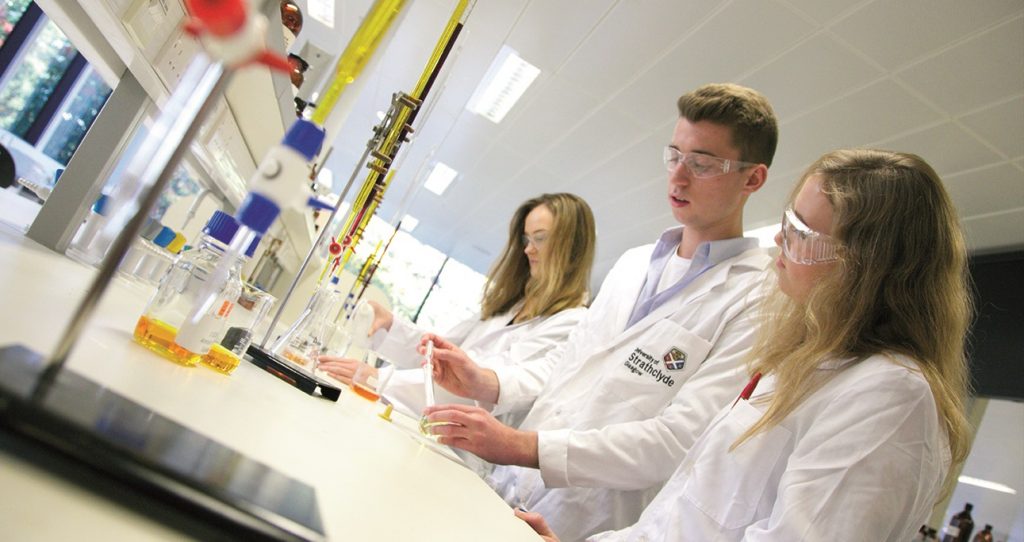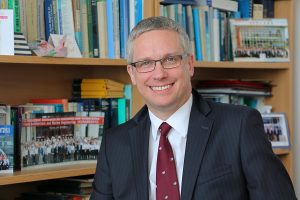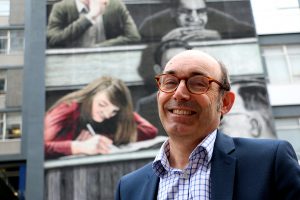The research group Higher Education Research and Development of Turku University of Applied Sciences (TUAS) focuses on multidisciplinary research of…
Tekijät | Authors

Joint programmes under work – The story of TUAS and University of Strathclyde, Part Two
The place of useful learning. Visitors to the university encounter Strathclyde’s catchphrase several times. Close connections with industries are fostered in order for the university to keep up with the development of business life and working life requirements. The representatives of Strathclyde perceive the same spirit at TUAS.
Dr Julia Race, the Head of Department of Naval Architecture, Ocean and Marine Engineering of the University of Strathclyde, participated in the Turku visit and was impressed by how clearly and uniformly the representatives of TUAS, the City of Turku and local industries articulated the educational needs and shortage of professionals within the region.
Race is participating in the preparation of the joint Master’s degree in Marine Technology between TUAS and Strathclyde. The idea is that students will carry out part of their studies in Turku and part in Glasgow and that the programme can also be completed part-time while working full-time. The programme combines different forms of learning.
“It also includes independent work and online tutorials”, Race says.
In addition to the Master’s Degree Programme in Marine Engineering, a joint Master’s programme in mechanical engineering, particularly related to digital manufacturing, is under planning. Degree Programme Leader in Mechanical and Production Engineering at TUAS Sakari Koivunen explains that the content is still taking shape. However, the aim is to focus on the opportunities of artificial intelligence and virtual reality, for example.
Working life of the future requires more and more flexibility from education.
Fitting the new Master’s degree programmes to the course timetables of both institutions and marketing them will take time. Therefore, according to Race and Koivunen, the new programmes will start in the autumn of 2019 at the earliest.
According to Race, the collaboration with TUAS has made Strathclyde people consider new ways of arranging international master-level degree programmes. The majority of the programmes are full-time at the moment. Race believes that the working life of the future requires more and more flexibility from education.
“People want to change their career paths and yet keep their jobs.”
Students from Scotland to Turku already in autumn 2018
The concrete cooperation between the two higher education institutions begins this autumn when TUAS will receive five Erasmus students who currently carry out their Master of Engineering studies at the Department of Mechanical and Aerospace Engineering of the University of Strathclyde.
According to Dr Andrew McLaren, who is in charge of the student mobility of the department, cooperation with TUAS takes place at the right time, as in his department, the number of students applying for exchange studies is higher than the number of exchange places available. 70 students, which makes up half of the fifth-year students of the department, will leave for student exchange around the world this autumn.

According to Dr Andrew McLaren, the Vice Dean (Academic) of the Faculty of Engineering at the University of Strathclyde, cooperation is easier when you know a colleague from the other party who shares the same educational philosophy. McLaren has known TUAS Dean Juha Kontio for a long time before the TUAS and Strathclyde collaboration started.
According to McLaren, student exchange is an easy way to start cooperation between these institutions, because the studies during the autumn exchange period consist of a project that doesn’t need to fit TUAS course timetables. Students will have an instructor at TUAS but the planning and implementation of the project are largely the responsibility of the students.
“As long as the learning objectives are met, we can be flexible regarding the contents of the project. We will assess the results of the work when the students return”, says McLaren.
Ewan Burns and Stuart Mair, students in mechanical engineering look forward to their exchange period in Turku. They think it’s great to get to know another culture, extend their professional competence and see how the Finnish industry as well as engineering studies and solutions differ from the Scottish ones.
Burns says that working life requires the ability to adapt to different environments, which is something that can be practised by student exchange. Mair is interested in engineering solutions related to sustainable development and renewable energy. He hopes that the project he will participate in during the autumn has something to do with these areas.
“I believe I can build a network of relationships in Finland during the term”, Mair says.
Andrew McLaren says that the student exchange programme promotes the future cooperation between the institutions and helps market joint Master’s degree programmes. Students are ambassadors who will speak about Strathclyde and Glasgow in Turku and about Turku and TUAS to their fellow students back in Scotland.
“It is exciting to be among the first ones. We have responsibility for maintaining a good reputation and connections”, Ewan Burns considers.
Aspirations to more extensive cooperation
The collaboration between TUAS and Strathclyde starts at marine and manufacturing technology industries, but promising prospects can be seen in the fields of drug development, biotechnology, the development of 5G networks and health technology. These discussions have also been participated by representatives of the University of Turku and Åbo Akademi.
In the field of health care, interesting similarities between the two cities can be identified.
Professor Tim Bedford, Associate Principal Research & Innovation at the University of Strathclyde, hopes the collaboration can be extended from student and staff mobility and joint degree programmes to research and enterprise cooperation in Turku and Glasgow.

When getting to know Turku, Professor Tim Bedford, Associate Principal Research & Innovation at the University of Strathclyde was impressed by the close collaboration between the city, educational institutions and industry within the Turku region.
For example in the field of health care, interesting similarities between the two cities can be identified. In Turku, companies operating in the field, higher education institutions and health care are brought together by Health Campus Turku. In Glasgow, the same is taken care of by the Digital Health and Care Institute, which develops digital solutions to meet the needs of Scotland’s health sector. Bedford believes that sharing research data and policies of the field may be fruitful.
“The higher the number of ways of cooperation there are, the better our chances for sustainable, persistent collaboration”, says Bedford.
According to Strathclyde’s Principal and Vice-Chancellor Professor Sir Jim McDonald, a successful cooperation is built between people, not organizations. He thinks that the cities and the leaders of higher education institutions must create a framework for this cooperation. Hence, he hopes an annual Finland-Scotland conference will be arranged within a couple of years.
“The conference would provide an opportunity for researchers, management of the cities and representatives of industry from both countries to share experiences and research data.”
Read Part One of the collaboration
Get to know University of Strathclyde
Photos of Andrew McLaren and Tim Bedford: Heidi Pelander
Photos on the front page and at the beginning of the article: University of Strathclyde








